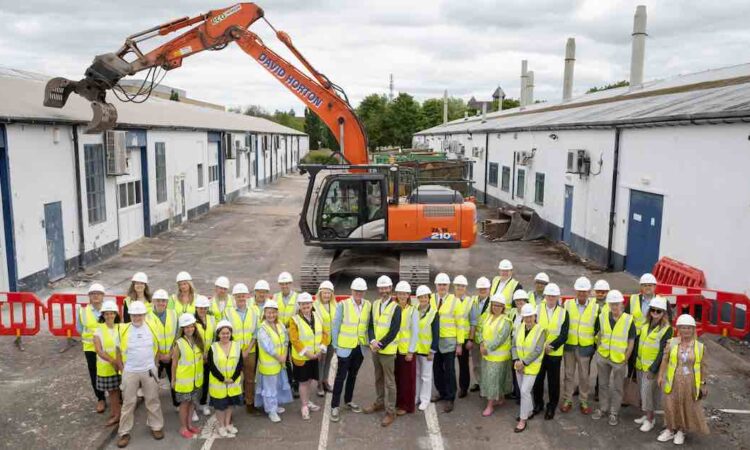
Milton Park held a ceremony to say goodbye to its remaining wartime buildings.
The last two single-story buildings at 57 and 59 Jubilee Avenue will make way for more technology accommodation and past and present members of Milton Park’s innovation community gathered to mark the occasion and to celebrate the success of the science and technology which spun out from its wartime heritage.
The former RAF depot developed early punch card machines and radio wireless technology.
During the First World War, The Royal Flying Corps used Milton’s strategic location on the Great Western Mainline as a supply depot in the early days of aviation.
RAF Milton Depot then played a key role during Second World War’s pivotal moments by supplying equipment and essential parts to keep planes flying, with more than 800,000 line items in stock, from Spitfire wings to buttons for uniforms.
After the war it became known as Milton Trading Estate and continued to be a hub for logistics and enterprise. It was bought by MEPC in 1985 which chose to take the risky decision to provide accommodation and support for spinout companies rather than safer more established ocupiers .
The buildings at 57 and 59 Jubilee Avenue were adapted to provide vital incubator space for pioneering science companies, which included early Oxford University spinouts such as Oxford Asymmetry International, acquired by Evotec, and Avidex, which evolved into Immunocore and Adaptimmune. Representatives from those drug discovery multi-nationals attended the event to commemorate their origins in the buildings.
The event gave former occupiers of the wartime buildings a chance to reminisce and reflect on their early days.
Kathryn Wilkes, vice president – human resources for Evotec, said the firm was based there in the 1990 with just one computer. The buildings were so cold chemicals froze in cold weather.
Pauline Cakebread, a member of Steventon History Society and executive director at Milton Park occupier Prosper21, an international brand and marketing consultancy, conducted research into the history in the run-up to the event.
She said: “Milton Park has a whole hidden history and was full of buildings like these one hundred years ago. Milton and its employees were heavily involved in the distribution of all the aircraft parts for the whole of the South of England during the Second World War.
“The site played a nationally critical role as well as having local importance for the community as a significant employer of women. Innovation was key in developing aviation technology and logistics then, just as it is today.”
Speaking at the event, Philip Campbell, Milton Park’s commercial director, told visitors: “Normally in the property world when we mark a milestone it’s usually to celebrate planning permission, groundbreaking, practical completion or an official opening. I can honestly say, this is the first time I have ever hosted or attended a demolition ceremony.
“It was a poignant event and I’d like to thank everyone for taking the time to share their personal stories and anecdotes as we look ahead to building on the past, whilst realising Milton Park’s future plans.”
A video about the park’s history can be seen here.
© Thames Tap (powered by ukpropertyforums.com).
Sign up to receive our weekly free journal, The Forum here.
